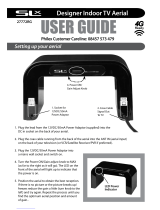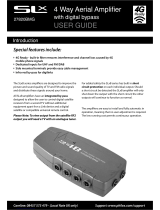If you are still experiencing reception
problems after the installation of your
SLxP Aerial Amplier, please refer below.
Analogue Terrestrial TV
Snowy Picture
A faint, grainy or snowy picture is generally caused
by a weak signal. Normally the TV transmitter
will be a long way away. A possible improvement
could be made by reducing the aerial downlead
losses, installing a high gain aerial and by adding
a low noise masthead amplier. In a small number
of cases, a snowy picture can also be caused by a
TV signal that is too strong.
‘Herringbone’ Pattern
‘Herringboning’ is generally caused by too strong
a TV signal or by a local high power transmitter
such as CB, amateur or taxi radio. Your TV sound
may be affected as well as the picture. Using an
attenuator will reduce the gain of an aerial signal
and improve the overall picture.
Digital Terrestrial Television
Unlike analogue TV signals that can still be viewed
under weak signal strength conditions, with digital
terrestrial signals blocking/freezing and/or loss
of digital picture and sound can be caused by
insufcient digital signal and carrier to noise ratio.
Similarly blocking and even a completely blank
screen with no sound can result if the input signal
to the set top box is too high. The digital cliff
refers to the rapid change from the picture
and sound being perfect, to disappearing
altogether.
When interconnecting equipment and to
get the best carrier to noise, place the digital
terrestrial television set top box as the rst item
in the signal path followed by any video or
satellite receiver.
Fitting a high gain wideband roof aerial may
also improve the reception and signal quality.
Digital signals are generally immune to
ghosting or multipath reections. They remain
perfectly receivable under conditions where an
analogue signal would suffer ghosting.
For specic help with DTT reception problems,
log onto www.dtg.org.uk.
Digital Satellite Television
With digital reception, a weak signal or
incorrectly aligned dish will cause the picture
and sound to block or disappear. Check both
the alignment of the dish and skew angle of
the LNB.
Intermittent Connections
Make sure all RF cable to connector joints
are tight (both inner and outer) including all
yleads and outlet plate connections.
Troubleshooting
© Philex Electronic Ltd. 2004
If problems persist, please contact
Philex Customer Careline: 08457 573 479
(Local rate – UK only)
Technical Support: http://technical.philex.com









